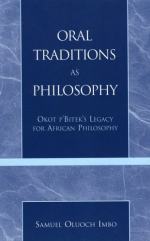|
This section contains 6,296 words (approx. 21 pages at 300 words per page) |

|
SOURCE: "Modes of Freedom: The Songs of Okot p'Bitek," in The Journal of Commonwealth Literature, Vol. XV, No. 1, August, 1980, pp. 65-83.
In the following essay, Heywood argues that p'Bitek's songs form an "ongoing meditation on Freedom."
Seen against the evolving context of historic change, the work of the leading African writers marks phases of ideological radicalization. The process stamps the oeuvre of Ngugi, Achebe, Armah, and Soyinka. In Okot's Songs it finds its most poignant voice.
The antinomy Lawino/Ocol utters the phase of hope and assertion: future roles and modes of self-perception are being defined in the positive, active mood of struggle for nationhood, a struggle which is still experienced as a struggle for freedom from colonial exploitation and alienation. With the antinomy Prisoner/Malaya we find ourselves in a later perspective. Freedom from has been attained, and what Berdyaev calls "the second freedom", the freedom to...
|
This section contains 6,296 words (approx. 21 pages at 300 words per page) |

|


